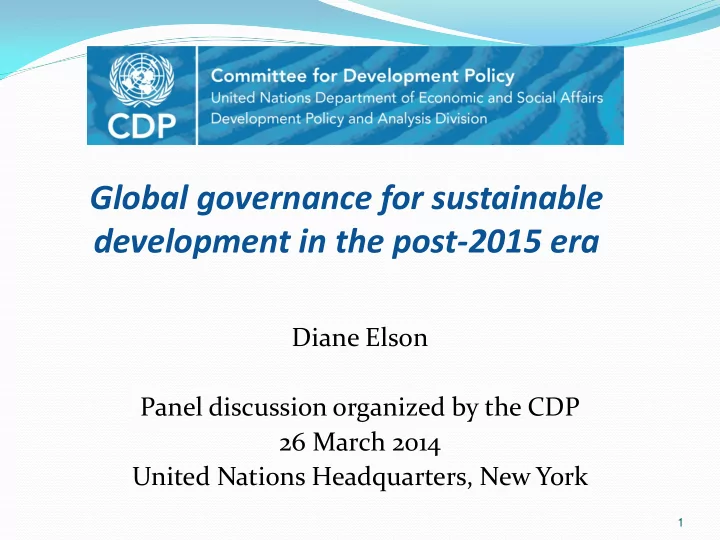

Global governance for sustainable development in the post-2015 era Diane Elson Panel discussion organized by the CDP 26 March 2014 United Nations Headquarters, New York 1
Global governance and global rules for development in the post-2015 era I . Introduction II. Global governance and global rules: why do they need reforms? III. Strengthening global governance and global rules 1. Global governance and the environmental agenda 2. International monetary and financial architecture 3. Trade rules: fostering development; preserving policy space 4. Capital mobility: the need for tax cooperation 5. Managing labour mobility: missing pillar of global governance 6. Addressing inequality: why good global governance matters IV. Global governance for development: role of the UN 2
Introduction How can global cooperation through its various institutions, arrangements and rules be reformed and strengthened to: • better manage the increasing interdependence among countries • reduce large inequalities that exist among and within countries • contribute to the fulfillment of internationally recognized social and environmental standards, while preserving the necessary policy space for government action ? 3
Obligations for international cooperation “Everyone is entitled to a social and international order in which the rights and freedoms set forth in this Declaration can be fully realized.” (Universal Declaration of Human Rights, 1948, art. 28). The Declaration on the Right to Development (1993) took this further, explicitly calling on states to act collectively, as well as individually, to create an enabling environment for development, particularly by removing obstacles and creating opportunities (Preamble, articles 1,2,4,7). 4
Deficiencies in current system of global governance Undersupply of global public goods • E.g., financial regulation • Oversupply of global public “ bads ” • E.g., tax havens • Asymmetries in access to decision-making • E.g., G8, G20 • Asymmetries in globalization processes • E.g., capital mobility compared to labour mobility • Asymmetries in outcomes • 5
Inequalities within countries and global governance WTO agriculture subsidies in developed countries - impact on small holders in developing countries Patent protection - impact on cost of essential medicines for poor people Lack of tax cooperation - impact on tax revenue Lack of adequate financial regulation – impact on macroeconomic stability and employment Shrinking of policy space to address inequality 6
Principles for reform Common but differentiated responsibilities and capabilities Subsidiarity Inclusiveness, transparency and accountability Coherence 7
Role of UN towards better global governance CDP calls on ECOSOC to take a leadership role in reforming global governance CDP welcomes the High Level Political Forum as part of High Level Segment CDP calls on ECOSOC to establish a strong monitoring and accountability mechanism that covers both developing and developed countries as well as private sector, NGOs and multilateral organisations 8
Recommend
More recommend